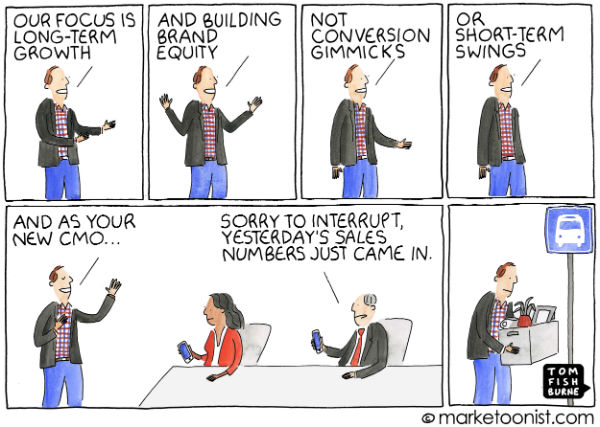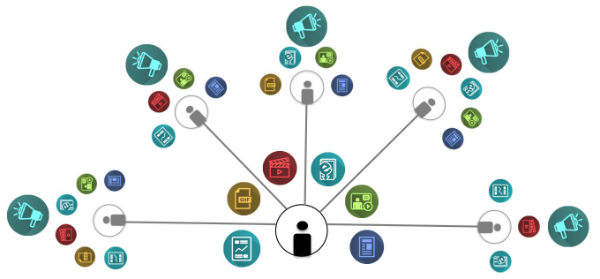The average tenure of a CMO is under 4 years representing a crisis in confidence amongst business leadership when it comes to marketing. Expectations for marketing are higher than ever amongst business leaders and customers alike.
To advance the valuable contributions marketing can make from boosting short term sales to growing long term market share, it is important for marketers to build trust and influence. But there are challenges:
- A study from Fournaise Group that fond 73% of CEOs say “Marketers lack business credibility and the ability to generate sufficient growth and 80% of CEOs simply don’t trust marketers at all, while 91% do trust CIOs and CFOs.
- New research from Marketing Week reports only 30% consider marketing ‘very important’ at large B2B companies.
- Marketing as a career suffers some credibility issues as well. A global jobs poll by HubSpot ranked the most trustworthy jobs with Doctor ranking number one and near the bottom, just above Car Salesman and well below Barista, “Marketer”.
- Marketing’s credibility amongst customers has been affected by some of the challenges facing media platforms – from fake news to inappropriate content to measurement. We’ve all seen stats like this one from Nielsen where 92% of consumers trust peer recommendations over advertising.
- Within B2B, research from TrustRadius reports 58% of B2B buyers do not believe claims made by the vendors they most recently bought from.
Despite these challenges the reality is that well researched, planned and executed marketing delivers incredible value for businesses and their customers. Research from Forbes shows Marketing strategy and investments can contribute over 50% of enterprise value.
How can marketers do a better job at building trust with company executives and customers to inspire more confidence in marketing? This is a topic I presented on recently at the e4M TechManch conference in Mumbai, India. There I outlined 5 “secrets” to growing the influence of marketing which I’ll dig into more below. I also reached out to a mix of marketing executives to get their perspective on solving putting marketing back on the right track:
Simple answer. Honesty. I know it sounds trite but trust is earned and earned through honesty. As marketers and storytellers we often “spin” things to suit our needs. I think more honesty about the company you represent is the only way to succeed. People relate to flaws. It’s human. It’s honest. I’m not suggesting that we promote those, I’m suggesting we don’t hide them. Customers will find the truth regardless and then you’ll have broken the trust. Zappos is a good example. Transparency is written directly into the Zappos Family Core Values, in the statement, “Build Open and Honest Relationships With Communication.”
Julie Roehm @jaroehm
Chief Experience Officer and CMO
ABRA
In today’s digital environment, marketers are at the forefront of business. As marketers, we are operating in a new paradigm that represents a tipping point and allows us to own the voice of the customer through insights and develop personalized experiences across every touch point. Through insight-driven marketing, we have the ability to anticipate new, unexplored business opportunities and bring this value to the c-suite.
Today’s consumer expects us to know them: how they think, how they act, and that we listen to their buying signals. Our biggest opportunity is to create an environment where we connect our customers seamlessly and consistently to our company’s purpose and values – whether they experiencing content on our website or in-product, at an event or in digital selling. Ultimately, this helps us to develop a strong pipeline of customer-first product innovation.
Ultimately, every major brand must become its own media publishing company.
No longer can we develop content in a linear way (e.g. build… then run). With the ever-changing dynamics of our industry with new digital platforms, marketers need to embrace an agile marketing mindset. The idea that we can Test. Learn. Change…. all of the time, not just in pilots. Core content should not take 6-8 months to develop; but rather, build core anchor content that can be atomized across every content distribution channel. Ultimately, every major brand must become its own media publishing company.
Kirsten Allegri Williams @kirstenallegriw
Vice President, Corporate Marketing
SAP Ariba
Trust, authority and credibility are earned as a result of programs developed and undertaken, with subsequent positive results. They are not just marketing programs, but must be contributing and supporting the company’s overall objectives. But, Marketers must protect their area of expertise. Everyone feels comfortable providing feedback to marketing programs, the onus is on the marketer to educate the “why”, but more importunately the “why not” when providing the feedback.
Kieran Hannon @kieranhannon
Chief Marketing Officer
Belkin International
Companies still view marketing primarily as a tactical, execution oriented discipline. This needs to change. Marketing has the most expansive view of how to drive growth.
Marketing has the most expansive view of how to drive growth.
Marketing needs to drive company-level corporate strategy and P&L decisions with a marketing mindset, not just an execution mindset.
Rishi Dave @RishiPDave
Past CMO
Dun & Bradstreet
In today’s worlds its all about the quality of A.I.R. you create; Authentic, Inspirational and Realistic marketing will win over your internal and external customers. For B2B marketers your best brand advocates are your employees. For B2C, your customers will accept nothing less than personalized perfection. Achieve both by creating AIR.
Jeanniey Mullen @jeannieymullen
Partner, Global Chief Marketing Officer
Mercer
Building credibility inside an organization is so important—alignment helps you get more effective results and also more budget!—but it’s not always so easy. The best way I’ve found get people onboard with your way of thinking is to do some marketing of your marketing. In other words, treat every relationship as if they were a customer.
Treat every relationship as if they were a customer.
What are the pain points for the people you’re working with and for? And how can you, through your job, help them solve these? Basically apply the golden rule of content marketing to your internal interactions: If you can provide value for someone, you develop trust.
Margaret Magnarelli @mmagnarelli
VP Marketing
Monster.com
There is no better time for marketing to gain credibility and trust. The field has shifted from a soft science to a programmatic science, making it more credible than ever before to quantify success with hard data. By showcasing sourced and influenced impact to designing compensation models for revenue success, not marketing success, we can transform the stature of marketing.
Chandar Pattabhiram @chandarp
CMO
Coupa Software
The best way to gain credibility is to speak plainly in the native tongue of your audience. Want credibility with consumers? Use layman’s terms. Want credibility with other executives within your company? Use business-focused outcomes and metrics. Save your marketing buzzwords for your next agency meeting or conference — and, even then, confirm you both mean the same thing when using those words 
Michelle Killebrew @shellkillebrew
Head of Global Performance Marketing, DevOps & West Regional Marketing Leader
CA Technologies
Stop solving for a local maxima. Impressions, clicks, leads, etc. They provide tiny fractions of business value. Instead, solve for the global maxima. Because deeply caring about long-term customer joy and company impact is inherent in that quest, the yield curve for your influence and credibity will head up and to the right!
Avinash Kaushik @kaushik
Digital Marketing Evangelist
Google
Marketers have to constantly take a holistic approach to ensure that they keep the user at the core of everything they do. The focus has shifted from attention-grabbing messaging to finding the right message for every customer. It’s all about building depth in customer relationships.
Nandini Rathi @Nandini_M
CMO Betaout.com
Founder, ContentCloud
People have to cut the bullshit in their marketing.
Sander Arts @Sander1Arts
CMO
Arduino
The sweet spot for marketing is when they know the market so well, and so deeply, that they are able to share market perspectives and intel with the customer, and are acknowledged internally as the customers’ aide-de-camp or advocate. With this knowledge of the landscape and their own firms’ strengths, marketing can help customers navigate uncertainty, and possibly also generate demand. This is how marketing can become central to success, and gain customers’ trust and credibility.
Bianca Ghose @BiancaGhose
Chief Storyteller
Wipro
5 Ways to Grow Influence, Credibility and Trust in Marketing
1. Accelerate the Internal and External Credibility of Marketing
- Internally: Find out the primary business problems faced by your management team and connect your marketing to help solve those problems.
- Internally: Promote your marketing wins, engage stakeholders and measure based on business impact vs. KPIs.
- Externally: Become the “Best Answer” for your customers with personalized, compelling content experiences that include authentic, influential voices.
2. Double Down on Activating Customers
- “It’s time to double down on customers, as their voices, opinions and beliefs say much more about a brand than traditional advertising or marketing can.” (Peter Mühlmann, AdWeek)
- 78% of people who read online reviews find them reliable. (ReportLinker)
- Increasing customer retention by 5% can lead to a 25% to 95% increase in company profits. (Harvard Business Review)
3. Work with Influencers to Become Influential
- Identify: Connect with qualified, relevant influencers and find ways to collaborate on customer-focused content.
- Qualify: Validate influencers and their audiences on a regular basis to ensure quality experiences.
- Engage: Employ always-on listening and social engagement to “keep the love alive” with a VIP influencer community of collaborators & advocates.
4. Create a Content Collaboration Ecosystem
If you help others, including customers, employees, and your brand’s community become more influential through content collaboration, the brand and marketing will grow influence as well.
5. Optimize Measurement to Customer ROI
- Attract: Is your marketing reaching the right audience on the channels they’re influenced by?
- Engage: Is your marketing creating meaningful and satisfying experiences where they want them? Are you creating raving fans?
- Convert: Is your marketing inspiring action across the customer journey: awareness, consideration, purchase, advocacy. Does it deliver on revenue?
There’s a lot to be said about how effective a thing is by how well it is done. Poorly researched, planned, executed and measured marketing doesn’t add a lot of value to the customer experience or the business bottom line. On the other hand, strategic, authentic, data informed and empathetic, dynamic and accountable marketing serves both customers as well as the performance of the business.
I think everyone in the marketing world has an opportunity to take a step back from the information overload and pressures of output on a daily basis to be more thoughtful about the marketing they’re doing. Of course we have to think about the immediate impact of content, ads and campaigns but also about the overall value and impact of marketing on our customers, business and industry. Marketing done well with a clear why, measurement and purpose creates the kind of value that both customers and business leaders will trust, ensuring credibility and investment far into the future.
Gain a competitive advantage by subscribing to the
TopRank® Online Marketing Newsletter.
© Online Marketing Blog - TopRank®, 2018. | Trust in Marketing is at Risk. These CMOs and Marketing Influencers Share How to Fix | https://ift.tt/faSbAI
The post Trust in Marketing is at Risk. These CMOs and Marketing Influencers Share How to Fix appeared first on Online Marketing Blog - TopRank®.
from Online Marketing Blog – TopRank® https://ift.tt/2uXNUx3
via IFTTT














No comments:
Post a Comment